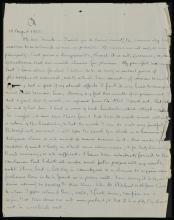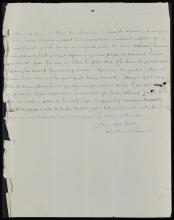BRACERS Record Detail for 55846
To access the original letter, email the Russell Archives.
The initials "CH" [Carleton Haynes] are written at the top of the letter. The letter was sent to Cave of the Home Office by Frank Russell.
BR wants early release because he needs to develop his ideas for important philosophical research. "You may recall that the Chairman of Quarter Sessions, in assigning me to the first division, said that it would be a national misfortune if my philosophical work were interfered with."
This represents the first time a copy of this letter was acquired for the Russell Archives. Later, another copy was acquired and placed in Rec. Acq. 903i, record 57186. The current file includes a printout of the National Archives' publication and transcription of the letter at http://www.nationalarchives.gov.uk/pathways/firstworldwar/britain/p_bertrand.htm.
Letter 67
BR TO FRANK RUSSELL, 12 AUG. 1918
BRACERS 55846. ALS. National Archives, UK. http://www.nationalarchives.gov.uk/pathways/firstworldwar/britain/p_bertrand.htm
Previous Brixton letter, BRACERS 18685; next letter, BRACERS 19343
Edited by K. Blackwell, A. Bone, N. Griffin and S. Turcon
<Brixton Prison>1, 2
12 August 1918.
My dear Frank
I wish you to know3 exactly the reasons why I am anxious to be released as soon as possible. My reasons are not only, or even principally, that prison is disagreeable, though it is not, of course, a place of residence that one would choose for pleasure. My principal reason is that I have ideas for what I believe to be a really important piece of philosophical research, with which I am exceedingly anxious to make progress; but in spite of my utmost efforts I find it very hard to accomplish much while I remain here. During my first two months of imprisonment I did a great deal of work, as appeared from the MSS I sent out.4 But at the end of that time I had a series of bad headaches, which obliged me to be careful; and ever since I have found that I cannot work much without a return of the headaches, and that the work I can do is not very fruitful. Philosophical research is not like the work of a clerk or a housemaid: diligence alone is not enough to ensure success in it. One needs also that condition of mind and body in which new ideas come; and for that, diligence, though necessary, is not sufficient. I have been reluctantly forced to the conclusion that I shall not make much further progress with my work until I have had a holiday in country air and a chance to acquire more freshness than is to be found in a prison cell. I am sorry it is so, as I desire intensely to develop the ideas I have. Either Dr Whitehead or Professor Carr, to whom I spoke about them,5 will, I feel sure, confirm me in saying that these ideas are not unimportant, and that it is a pity they should not be worked out.
You may remember that the chairman of Quarter Sessions, in assigning me to the First Division, said that it would be a national misfortune if my philosophical work were interfered with.6 He was obviously humane and enlightened, but without experience of either prison or research. I feel convinced, from the way in which he spoke, that, if he knew the present state of affairs, he would favour my release. Apart from the question of physical fitness, I am seriously hampered by not having access to a library and by not being able to discuss philosophical questions except rarely and briefly. If you will consult any philosopher of your acquaintance, he will tell you that, although I ought to be able to work in prison, he himself, being of a peculiarly sensitive disposition, would be quite unable to do so. And the fact is that peculiarities of this kind are usual among those who have any capacity for original thought.
Your affec. brother
Bertrand Russell.
- 1
[document] The letter was edited from both an early photocopy and a recent digital scan of the signed original in BR’s hand in the National Archives, UK. The photocopy was a better source for readings close to the right edge of the sheet’s recto. It bears the initials “CH” of the Brixton Governor. The letter is published on the National Archives’ website at http://www.nationalarchives.gov.uk/pathways/firstworldwar/britain/p_bertrand.htm.
- 2
[address] BR wrote this letter from Brixton. Although it is not on the prison’s letter-writing form, it was approved by “CH”.
- 3
I wish you to know Although Letter 67 was addressed to Frank, BR really wanted his brother to forward it to the Home Secretary, Sir George Cave (see Letter 69). But the Home Office was unmoved by BR’s entreaties, with one official minuting that it was “not a letter that would prepossess anyone in the writer’s favour!” (quoted in Papers 14: 416).
- 4
MSS I sent out I.e., the manuscripts of Introduction to Mathematical Philosophy (London: Allen & Unwin, 1919); “Professor Dewey’s Essays in Experimental Logic”, The Journal of Philosophy, Psychology and Scientific Methods 16 (2 Jan. 1919): 5–26 (16 in Papers 8); “Pure Reason at Königsberg”, The Nation 23 (20 July 1918): 426, 428 [review of Norman Kemp Smith, A Commentary to Kant’s “Critique of Pure Reason”] (14 in Papers 8); and, later, review of C.D. Broad, Perception, Physics, and Reality, Mind 27 (Oct. 1918): 492–8 (15 in Papers 8). He had, also, by this time, written and circulated several short manuscripts on the nature of propositions preparatory to writing “On Propositions” (see 18 in Papers 8).
In addition to these writings for immediate publication, BR wrote “On ‘Bad Passions’”, Cambridge Magazine 8 (1 Feb. 1919): 359 (19 in Papers 8), “Bertrand Russell’s Notes on the New Work Which He Intends to Undertake”, App. II in Papers 8), and the notable “The International Outlook” (100 in Papers 14); and he circulated some or all of a fair number of preliminary sketches (see 18 in Papers 8) for the major project that became The Analysis of Mind. There may be other, missing manuscripts as well (see Letter 41). See also BR’s own list, headed “Written in Prison” (Papers 8: 317). Not all of the above were sent out “in my first two months”, as he wrote in the present letter. - 5
Dr Whitehead or Professor Carr, to whom I spoke about them BR had “business” visits from Carr on 21 June and 12 July and from Whitehead on 23 June. Of the latter visit, BR told Frank they had “a good talk on philosophical matters” (Letter 27).
- 6
chairman of Quarter Sessions... First Division … national misfortune … interfered with In upholding BR’s conviction, Allan J. Lawrie (who was deputy chairman of County of London Quarter Sessions) nevertheless instructed that the sentence be served in the comfort of the first division, as opposed to the harsh conditions and strict discipline of the second. Lawrie told the court that “it would be a great loss to the country if Bertrand Russell ... were confined in such a form that his abilities would not had <sic> full scope” (“Our Prosecution”, The Tribunal, 9 May 1918, p. 2). The Home Office was disappointed with Lawrie’s judgment, in which he also questioned the length of BR’s sentence (see also notes 3 and 4 to Letter 6).


